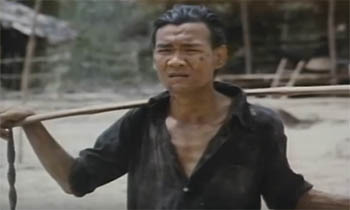5 Reasons Why Method Acting Should Be Laid To Rest

Acting isn't a very dangerous profession. Especially modern acting, which is, on average, 10 percent punchlines and 90 percent standing in front of a green screen, yelling at Robert Downey Jr. to "DESTROY THE SCEPTER!" or whatever. Maybe that's why we see so much praise being heaped upon "method acting," which is the art of truly inhabiting your character. Regular actors are seen as disposable side-character machines, but method actors? They're basically treated as cinema wizards, infinitely more talented and remarkably more insufferable than any normal thespian.
And rather than say "Okay, take the dirt out of your mouth and step away from the script," Hollywood has embraced method acting to an absurd degree. And it's because of this obsessive love that we now live in a world where ...
Method Acting Has Become A Sick Competition
For the last several decades, "great acting" has been normalized as Method acting, which is to say, the Marlon Brando-popularized technique of internalizing character to a frightening degree, in pursuit of a more "real" performance. The openly theatrical style of performers like Frank Sinatra was tossed in a dumpster on Broadway, and replaced by Brando's grit and slurring intensity. Then the 1980s rolled around, cocaine got good, and actors decided they really wanted to do some crazy shit. And like a Stanislavskian Terminator, Daniel Day-Lewis warped into our world.

The exploits that have occurred in Day-Lewis' eternal quest to remain in character are legendary: he broke his own ribs for My Left Foot, fought random strangers in Rome for Gangs Of New York, and learned to speak Czech for The Unbearable Lightness Of Being, just so he could speak with a Czech accent. Just to reiterate that: The man learned an entire language, just so he could then perform his lines in an entirely different language, but with just a touch of an accent. That's fucking bonkers, no matter how you feel about art and cinema and wacky mustaches.
It's all well and good for Day-Lewis; it's fun to have a really nutty actor out there to win Oscars for us and maybe make some nice shoes while he's at it. But now other actors have picked up that the best way to be truly great is to torture yourself. That's why Jared Leto starved himself to win an Oscar for Dallas Buyers Club, and mailed used condoms to his co-stars to prepare for the role of the Joker. That's why Adrien Brody dumped his girlfriend and ditched his life to be in The Pianist. It's why Jamie Dornan followed a random woman to get in the head of a serial killer for The Fall. If you replaced the second half of most of the sentences in this paragraph with "and then began a police standoff that lasted three days," it would fit just as well.

It's all the same path that made Dustin Hoffman stay up for days (supposedly) to look exhausted in Marathon Man, even though he got thrown shade from Laurence fucking Olivier to JUST ACT. Acting is becoming a war of escalation over what an actor is willing to do in real life, instead of, you know, while acting.
We Reward Trauma With Awards
It doesn't help that we basically equate terrible things happening with Oscar-bait. According to a report compiled by two California sociologists in 2014, the Academy Of Motion Picture Arts And Sciences consistently hands out Oscars to biopics and historical films. What that means is that they want stories about real people who have suffered. A good story or innovative filmmaking techniques are only secondary to real-life stories of real-life awful shit.
That's why a Cambodian refugee named Haing Ngor won a Best Supporting Oscar; he got it for reliving his insanely horrific life story. Just like in the local news, if it bleeds, it leads. The film he won it for, The Killing Fields, was not a documentary; it wasn't even an exercise in replicating precise events, like the more recent The Act Of Killing. Rather, they liked a man reliving a nightmarish period of his life so much that they gave him a little gold statue for it. It all balances out!

When you factor in that the Academy hates awarding comedies (and that's if you can take Shakespeare In Love as a comedy), it becomes pretty apparent that we're all on board with the idea that real-life tragedy sure makes for a great film experience. So it's not surprising that ...
Audiences Want To See Beautiful People Tortured
Okay, so the stage is set: Actors know they need to torture themselves. If you're not willing to do some ridiculous and dangerous shit, you know what? Jake Gyllenhaal is, so step up your game. They know that real-life torture is really great for Awards, because we are a culture formed by our worst impulses. But it's not enough to just play the part and play it really well. How are we supposed to know that you did a good job if you're not covered in mysterious blood and obvious dirt? HOW?
The next step: We want to see actors really make themselves less attractive for us. We gave Charlize Theron, one of most beautiful women in the world, an Oscar when she radically changed her appearance for Monster. And she gave us a terrifying yet sympathetic performance, but most reactions to that film remain "This movie is a good movie because that doesn't look like Charlize Theron to me."

Same deal for Nicole Kidman for The Hours and her prosthetic nose. It's the reason Leonardo DiCaprio keeps growing increasingly rat-like facial hair for his roles, like he wants us to forget that he was the prettiest one on the Titanic, and the second-prettiest one in Catch Me If You Can (Tom Hank's cheeks are irresistible.)

On some level, if we can't really torture them to death (yet ... ), we'd like to see them taken down a peg. It's a weird double standard; we only want to see the most attractive people that have ever existed on screen, and yet we reward them for diminishing the very quality that made them notable to begin with. On some level, it shows that we want to see these beautiful people on screen be less beautiful, which is to say, we want to see some stuff happening to them. And when they have thoughts about how weird it is to be a beautiful person in an industry that both values beauty above all things and yet also rewards dramatic ugliness, like Theron, we mock them for it. Even less reason for actors to complain and just get back to it. And it's not just the actors anymore ...
We Think Painful Acting Creates Beautiful Movies (And That Sucks)
That same mentality, that the only "real" acting must involve suffering, has now infected our perception of films in general. Remember Leonardo DiCaprio, the blue-eyed wunderkind who got laid and then froze to death on the world's largest metaphor for hubris? He seemed to be struggling for an Oscar so hard that it became its own meme.

And when he finally did win one, for Alejandro Gonzalez Inarritu's The Revenant, all anyone really talked about was how much it sucked for DiCaprio. Not that it was Inarritu's follow up to winning Best Picture and Best Director the same year, and that he won Best Director again; not that it was a triumph of filmmaking and naturalistic lighting techniques; not even really what the plot was about (Tom Hardy ... walks places?). In another world, we're celebrating The Revenant because it's one of the best new Western-esque films in an age where most people look at Westerns as a genre that John Wayne had buried with him.

No, the most important thing about the film was that an actor suffered. A movie that won multiple Oscars and had an amazing pedigree was still boiled down in public consciousness to the weird decision of an actor to get award-winning frostbite. And all of this is bad, because ...
We're Not Afraid To Give An Oscar To A Corpse
If you think that the Academy won't reward a dead person with an Oscar, think again. There's a whole list of people who've been given posthumous Oscars. And we already lionize dead actors, particularly ones like James Dean (again, a noted Method actor who tended to take things a little too far) who died young and passionate. That's why Megan Fox has a tattoo of Marilyn Monroe, for fuck's sake. We're obsessed with the idea that dying fast and young means having some kind of gift that the over-40s will never be able to grasp.
That's why people weirdly conflate the death of Heath Ledger with his crazy Method immersion into the role of the Joker, even though he'd moved on by then. We just looove the idea of actors dying for their art. And there'll probably be some complaints about the ghoulishness of showing a movie in which someone dies, but if it's for the almighty Art, people will cave. They did it for multiple volumes of Faces Of Death, you think they won't do it for a truly transcendent performance? That's why we need to second-guess any mindless devotion to method acting. It can really only end one way: death.

Combine the weird hero-worship of Hollywood, an ever-increasing demand for actors to risk their lives and health for roles, and an industry that considers tragedy to be Oscar-bait, and you've got a sure-fire recipe for someone getting mortally wounded while in the pursuit of critical acclaim. But hey, at least they'll have "Best Actor" on a resume that they'll never be able to use again.
Nathan Kamal lives in Oregon and writes there. He co-founded Asymmetry Fiction for all your fiction needs.
For more check out The 5 Craziest Ways Famous Actors Got Into Character and 7 Famous Actors Who Lost Their Minds Getting Into Character.
Subscribe to our YouTube channel and check out 8 Times Your Favorite Actors Almost Died On Film, and watch other videos you won't see on the site!
Also follow us on Facebook. For real.